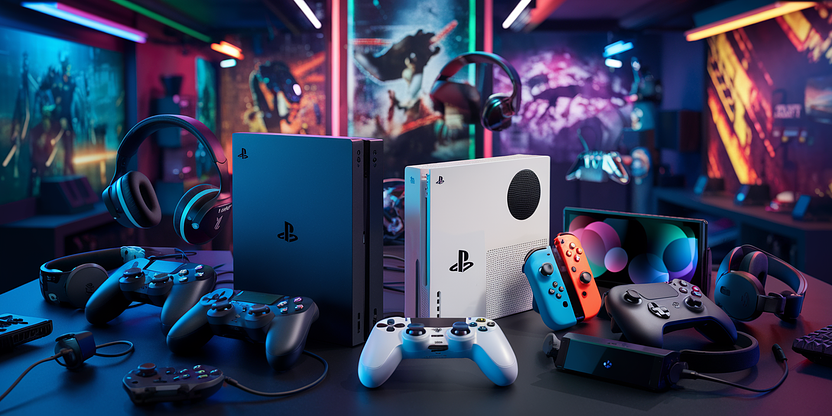
Console Buying Checklist: PS5, Xbox & Key Specs (2025)
Introduction
The world of gaming continues to evolve, bringing forth new and improved gaming consoles that promise to transform your gaming experience. In 2025, the choices could seem overwhelming with giants like Sony and Microsoft releasing the latest versions of their consoles. Whether you're a seasoned gamer or a newcomer looking to dive into the gaming universe, our console buying checklist will guide you through selecting the ideal console that meets your personal preferences and budget. From specifications to accessories, we ensure you make a well-informed decision.
The Complete Checklist
[ ] Console Types & Models
Why This Matters:
Understanding the various types of consoles available helps you align your choice with your gaming needs.
What To Look For:
- Console type: Home, handheld, hybrid
- Latest models: PS5, Xbox Series Z
- Backwards compatibility options
Recommended Products:
Budget Option: Xbox Series S ($299)
Great for casual gamers, lacks disk drive.
Best Value: PS5 Digital Edition ($399)
Offers a balance of performance and price.
Premium: Xbox Series X2 ($599)
Top-tier performance with advanced features.
Common Mistake: Overpaying for features you won't use. Assess your needs realistically.
[ ] Processing Power
Why This Matters:
Processing power dictates how well games run, impacting graphics and loading times.
What To Look For:
- CPU: At least 8 cores
- GPU: Ray tracing capabilities
- RAM: Minimum 16GB
Recommended Products:
Budget Option: Xbox Series S ($299)
Adequate for most modern games.
Best Value: PS5 ($499)
Balances power with cost, great for most gamers.
Premium: Xbox Series X2 ($599)
Handles the most demanding games seamlessly.
Common Mistake: Ignoring future-proofing. Consider how your console will perform in coming years.
[ ] Storage Capacity
Why This Matters:
Games now require significant space, making storage a crucial component to consider.
What To Look For:
- SSD: At least 1TB
- Expandability: Options for external drives
- Cloud storage capabilities
Recommended Products:
Budget Option: Seagate Expansion Card (512GB, $109)
Affordable expansion for Xbox.
Best Value: PS5 Standard (1TB SSD, $499)
Integrated storage with upgrade potential.
Premium: Xbox Series X2 (2TB SSD, $699)
Ideal for gaming enthusiasts with extensive libraries.
Common Mistake: Focusing solely on console memory. Consider external expansions.
[ ] Graphics Resolution
Why This Matters:
Higher resolutions provide a more immersive and visually appealing gaming experience.
What To Look For:
- Minimum: 1080p
- Optimal: 4K
- Future-ready: 8K capabilities
Recommended Products:
Budget Option: Xbox Series S (1440p, $299)
Great visuals for the price point.
Best Value: PS5 ($499)
Delivers stunning 4K gaming.
Premium: Xbox Series X2 (8K, $599)
Future-proofs your entertainment experience.
Common Mistake: Investing in capabilities that your current TV doesn't support. Match console output with display capabilities.
[ ] Enhancing Accessories
Why This Matters:
Accessories can significantly enhance your gaming experience by providing comfort and improved control.
What To Look For:
- Controllers: Ergonomic designs
- Headsets: Noise-canceling features
- Charging docks: Convenience and efficiency
Recommended Products:
Budget Option: PowerA Enhanced Wired Controller ($29)
Affordable and reliable extra controllers.
Best Value: Sony Pulse 3D Headset ($99)
Great audio quality for an immersive experience.
Premium: Xbox Elite Series 3 Controller ($179)
Highly customizable and durable.
Common Mistake: Forgoing quality for a lower price. Poorly made accessories can hinder gameplay.
[ ] Online Subscription Services
Why This Matters:
These services provide access to multiplayer options, free monthly games, and exclusive discounts.
What To Look For:
- Multiplayer access
- Game libraries: PS Now, Xbox Game Pass
- Extra perks and discounts
Recommended Products:
Budget Option: Xbox Live Gold ($9.99/month)
Basic subscription for online play.
Best Value: PS Plus Extra ($14.99/month)
Decent game selection with added benefits.
Premium: Xbox Game Pass Ultimate ($16.99/month)
Wide library and many additional perks.
Common Mistake: Not evaluating the game library. Choose services that offer games you enjoy.
Budget Summary
Category Budget Total Best Value Total Premium Total Console & Specs $299 $399 $599 Accessories $29 $99 $179 Subscriptions $9.99/month $14.99/month $16.99/monthFAQ
What is the difference between the PS5 and PS5 Digital Edition?
The PS5 Digital Edition is a disc-free console with the same performance specs as the standard PS5 but at a lower cost.Are current-gen games compatible with these new consoles?
Yes, both PS5 and Xbox Series consoles offer backwards compatibility for many popular current-gen games.How important is 8K support right now?
While impressive, 8K is not yet widely supported in most media or games; 4K remains the optimal choice for most users.Can I use my old controllers on these new consoles?
Some older controllers can work, but new models are optimized for better performance and new features.Do I need an extra subscription for multiplayer gaming?
Yes, subscription services like Xbox Live Gold and PS Plus are required for online multiplayer.
Final Checklist (Quick Reference)
- [ ] Console Types & Models
- [ ] Processing Power
- [ ] Storage Capacity
- [ ] Graphics Resolution
- [ ] Enhancing Accessories
- [ ] Online Subscription Services
 Checklist Method
Checklist Method



